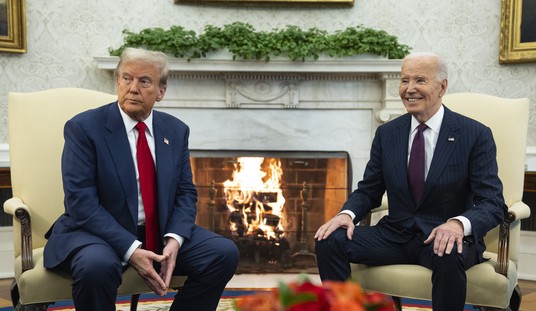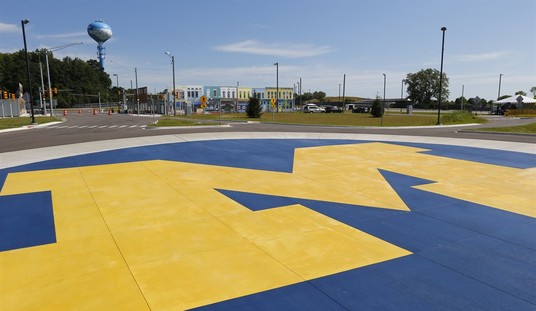Earlier this week, John Hawkins asked on Twitter if anyone had made a case for Donald Trump’s path to victory in a general election, and whether such a case could even be made. I replied that the scenario was “not impossible to imagine,” and then gave a brief thumbnail description of one:
@johnhawkinsrwn Rallies disaffected blue-collar voters in both parties, wins the Rust Belt, with RNC ground game making up for GOTV issues.
— Ed Morrissey (@EdMorrissey) February 16, 2016
As the South Carolina primary approaches, some of those dynamics are already in play. The Christian Post reports that Trump, who isn’t exactly known for Christian humility, has managed to grab a large number of evangelical voters anyway, despite the appeals from both Marco Rubio and Ted Cruz to faith. Those voters are angry and want radical change:
Brent Nelsen, a political science professor at Furman University in Greenville, S.C.,told The Christian Post that Trump’s political message is appealing to a number of South Carolina conservative evangelicals who he never thought would vote for a guy like the billionaire real estate mogul.
“There are lot of evangelicals who are going for Trump,” Nelsen, a Wheaton College graduate, said. “Guys at my church who I never would have thought would be that willing to vote for what seems to me to be a guy who is not real serious about his faith and at least not until he is running for office, but they don’t care.”
“Trump is very much drawing on the anger of so many people who feel like they haven’t gotten much out of recent changes in the economy,” Nelsen argued. “Donald Trump has decided that he is going to make it very clear that all the Republican leaders, in his mind, have not been doing their job and have not been representing the people that have voted for them for a long time and that he is finally going to do it.”
The Atlantic’s Bill Rauch warns Trump supporters about counting chickens before hatching, as evangelical leaders may exert their influence in the last hours before the voting begins — as they did in Iowa. However, Trump’s appeal to these voters may override their concerns about faith by addressing their desire for strong national borders and prioritizing American workers over global trade:
Simpsonville, South Carolina, is located on the upstate “Golden Strip” near Greenville, where many newly arrived manufacturing companies have located. It is also home to the Brookwood Church, which seats 2,200 parishioners and fills up twice each Sunday. Brookwood’s senior pastor, Perry Duggar, places particular importance on whether or not candidates “value the Constitution.” After speaking with dozens of evangelical pastors, it became clear that this was a favored shorthand or code phrase among them.
So, what does “value the Constitution” mean to evangelicals? Broggi offered this interpretation: “There are two parts to that. The Constitution prescribes national borders, so ‘protecting the Constitution’ means protecting the nation’s borders. The Constitution also calls for protecting the safety of U.S. citizens, and that means ensuring order in all the nation’s neighborhoods. In London and in Paris now, there are neighborhoods where the police no longer go. They are ruled now by sharia law. We are for religious tolerance, but we are not for that.”
Border security and Muslim control—now those sound like Trump issues. That’s no coincidence. Trump’s advisers have known from the campaign’s outset that evangelical gauntlets in Iowa, South Carolina, and elsewhere stand between their candidate and the nomination. And their candidate, a twice-divorced former casino owner from Manhattan, had some ground to make up. He still does.
Not in South Carolina polling he doesn’t, at least not in a three-, four-, or five-way race. His large lead with less than 72 hours to go before the polls open suggest that he’s very likely to finish first for the second primary in a row. Since states are still allocating delegates on a proportional basis until the contests on March 15 and beyond [see update below], those finishing in second and third still have reason to toil onward. But South Carolina was supposed to cull the moderates from the leader board — and if Trump wins in the Palmetto State, it shows that his brand has broader appeal than many, including some Republicans, would like to admit.
This shows that Trump has a path to overall victory, as I argue in my column for The Fiscal Times, since the same anger and frustration has driven the primaries in both parties:
Part of those assumptions have to do with the consideration primary voters usually give to electability. Trump is too vulgar, obnoxious, or vague to win a general election, the argument goes, and his likability numbers are the worst in both party’s primaries. Yet in national polling, Trump shows a competitive position against both Clinton and Sanders. A Suffolk University poll conducted on behalf of USA Today released this week shows Trump slightly ahead of Clinton, 45/43, a similar position to Cruz (45/44), and only slightly more narrow than Rubio (48/42). Unlike Cruz, Trump also edges out Sanders (44/43), while Rubio again only narrowly outperforms Trump (46/42).
How can this be possible? Voters have made it clear all along. The current political establishment in Washington and both parties have lost their trust. Under the leadership of both parties, the US has run up a massive amount of debt, failed to deliver on decades of campaign promises, and allowed bitter partisanship to stall any potential solutions. …
Trump has rallied voters disaffected by both gridlock and failure and promised them his expertise in finding success on their behalf. His incessant attacks instill confidence among his supporters that he will not back down short of victory. He aims those attacks at both sides of the aisle; blaming George W. Bush for 9/11 falls right into this strategy. For those who want to tear down the gridlocked establishment without caring much about policy specifics or ideological purity, Trump offers the brightest hope in the field.
This puts Trump in position to challenge either Democrat for the presidency. Clinton would be Trump’s easiest target; she represents nearly a quarter-century of the political establishment, and her personal polling qualities are nearly as bad as Trump’s. Clinton was beaten by Hope and Change eight years ago, and now she is more than ever the candidate of the Status Quo.
But Bernie Sanders might make almost as easy a target, having spent the last 25 years in Congress with very few real accomplishments other than maintaining his status as the only declared Socialist on Capitol Hill. His first steady income came as a politician, and it has been his only real job since graduating from the University of Chicago. Sanders might win the intellectual elite and the college-age voters who rarely turn out in large numbers, but Trump might have a claim on nearly everyone else.
That’s not an argument for nominating Trump, or even a prediction of success; it’s one scenario among several, and perhaps not the most likely. However, it is an argument for people to stop underestimating him, and the forces that have propelled him to dominance in this race. Voters want change, and they’re no longer patient enough to bother with etiquette and Marquess de Queensbury rules. In fact, Trump has already started on his general-election campaign in that sense, attacking the old GOP establishment to boost his credentials as someone who will not stop short of overturning all of the applecarts.
Addendum: In my tweet to John, I mention that the GOP has an independent presidential GOTV apparatus in place for the nominee to use. I cover more of that in my upcoming book GOING RED, but suffice it to say that while Trump will have to spend money in the general election, the ground game may not be as big a worry as it would otherwise have been for an insurgent candidate.
Update: South Carolina was granted an exemption by the RNC to the proportional allocation rule. It is a winner-take-all state.








Join the conversation as a VIP Member